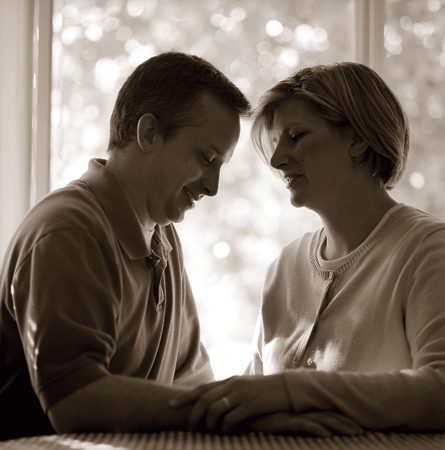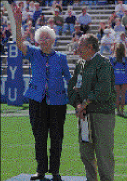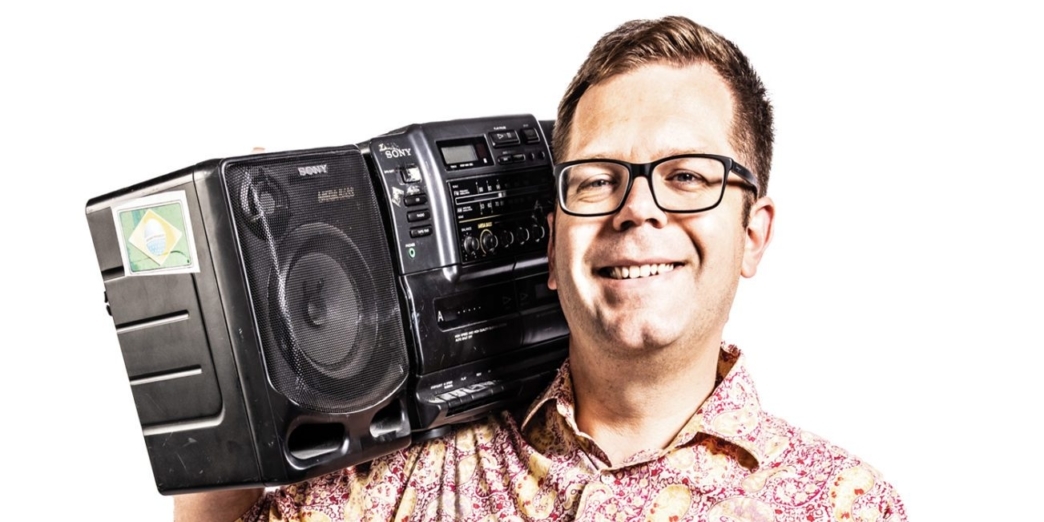BYU researchers say there is much couples can do to revitalize their marriage.
Few married couples would consider their relationship in terms of the second law of thermodynamics, but marital experts say they should. Also known as entropy, this law states that energy degrades over time. In layman’s terms, entropy says that, absent intervention, things naturally move toward disorder.
Applied to marriage, says Stephen F. Duncan (MS ’85), a professor in BYU’s School of Family Life, entropy suggests that, starting on your wedding day, your marriage will begin a slow downward slide—that is, unless you take action.
“Entropy is caused by inattention to the emotionally soft underbelly of a marriage, which needs constant attention,” says Duncan. “We have to do something active to counteract the erosion processes that are a natural and normal part of most marriages.”
A powerful countermeasure is marriage enrichment, a subject that has been researched by several BYU professors, including Duncan and fellow School of Family Life professor Jeffry H. Larson (BS ’71). They include under the marriage-enrichment umbrella any deliberate activity that works to change an individual’s or couple’s attitudes, skills, and behavior, including going on weekly dates, reading books and Web sites about ways to strengthen marriage, and participating in seminars that teach such relationship skills as good communication and conflict resolution.

Marriages often degrade over time, but BYU researchers say this decline isn’t inevitable. With work, couples can fight entropy to keep their marriage strong.
Larson sees marriage enrichment as a powerful preventive tool against the corrosive effects of such common marital woes as excessive conflict, unresolved anger, defensiveness, and criticism. His 2004 book, The Great Marriage Tune-Up Book: A Proven Program for Evaluating and Renewing Your Relationship, takes a workbook approach to helping couples inexpensively evaluate their marriage’s assets and liabilities and then work on minimizing the problems. “The tune-up idea is to get under the hood and look at the oil filter, the spark plugs, the hoses and see your strengths and deficits. It’s easier and cheaper to do a tune-up than an overhaul. If you just changed your oil, you wouldn’t have engine problems,” Larson says.
Larson and Duncan advise couples whose marriages are reasonably happy to prevent marital entropy by finding and following a marriage-enrichment approach that fits their personalities and goals. (Couples in distress should seek counseling or carefully check out enrichment programs to make sure they are appropriate for their situation.)
“Couples need to be actively involved in doing something to enrich their marriage all the time. They need to be proactive. They cannot afford to be neglectful,” says Duncan.
The Value of a Tune-Up
Over the years researchers have evaluated many marriage-enrichment programs. In 1985 researchers analyzed 85 such programs, and they found them to be remarkably effective overall. The average couple who participates has a better marriage than two-thirds of those who do not participate.
More specifically, enrichment programs improve marriages by teaching skills. For example, couples can learn how to identify the positive aspects of their marriage and find ways to build on them. Some programs focus on how to communicate better, especially on how to resolve conflict more effectively. Most programs teach listening skills, which improve understanding of one another and thus build closeness. The result for those who participate, proponents say, is a marriage with more loving interaction, less conflict, and improved intimacy, both emotional and physical.
Picking the Right Approach
Couples who want to improve their marriage have many options:
Workshops and seminars. Marriage experts have developed dozens of programs to help couples strengthen their marriages. Duncan and Larson recommend four in particular because they are both undergirded by research and in harmony with LDS principles.
1. Several long-term studies have shown the Prevention and Relationship Enhancement Program (PREP) to be effective in helping couples improve their marriages and prevent divorce. Developed at the University of Denver, it teaches communication and conflict-management skills in a 6-to-12-hour workshop, all in one day or split into several days. PREP does not allow couples to disclose personal problems during its workshops. To find a workshop in your area, visit www.prepinc.com.
2. Couple Communication (CC), a research-based program from the University of Minnesota, teaches 11 skills that effectively strengthen marriages. The program is geared to help couples enjoy each other more, learn to make mutually satisfying decisions, reduce tension, and manage their differences. Couples can learn CC’s skills privately or in a group. For more information go to www.couplecommunication.com.
3. Relationship Enhancement is one of the oldest and most-studied marriage-enrichment programs. It essentially teaches couples to be therapists for each other by building their “expressive,” “empathetic,” and “facilitative” (or coaching) skills. It emphasizes building marital strengths rather than identifying and fixing weaknesses. More information can be found at www.nire.org.
4. The RELATE questionnaire, developed at BYU by Thomas B. Holman (MREd ’76), a professor in the School of Family Life, Larson, and other BYU colleagues, is designed to help couples prepare for marriage, but couples at any stage of their relationship can benefit. Couples take the RELATE questionnaire online for a $20 fee ($10 each), then review a results sheet that tells them where each person is strong or weak in areas that predict marital success. For more information go to www.relate-institute.org.
LDS curriculum. At the discretion of bishops, wards can offer the Church’s 16-week Marriage and Family Relations course during the Sunday School hour. If your ward isn’t currently offering the course, you can request it or you and your spouse can go through the course materials yourselves. Both the instructor’s manual and the participant’s study guide are available through Church Distribution or online at www.lds.org.
Books and Web sites. Many research-based books have been written to help couples enhance their marriages. Duncan and Larson recommend three in particular (in addition to Larson’s Great Marriage Tune-Up Book) that are consonant with LDS values: The Seven Principles for Making Marriage Work,by John M. Gottman and Nan Silver; Why Marriages Succeed or Fail . . . and How You Can Make Yours Last, by John M. Gottman; and Fighting for Your Marriage, by Howard Markman, Scott Stanley, and Susan Blumberg.
The Web sites of the first three enrichment programs listed above offer independent study approaches to the skills taught in the workshops. Spouses can study these materials individually or together. A Web site developed by Duncan, Forever Families (www.foreverfamilies.net), has a large repository of articles written for a general audience about how to strengthen marriage.
Loving and Caring
“The Family: A Proclamation to the World” states that husbands and wives “have a solemn responsibility to love and care for each other.” Duncan wants people to notice the “love and care for” phrase and consider its implications. “It’s ‘love and care for’—it’s not tolerate or criticize or try to improve. Love and care for.”
Duncan recommends couples look to the scriptures and the Savior for a full definition of what love means. “Love is the lodestar trait of relationships. Our Restoration scriptures define what love is—it’s love in association with Jesus, who is the source and embodiment of love. That’s the kind of love we need to learn in marriage as well as every other relationship.”
When we’re able to love as the Savior did, says Duncan, the little annoyances in marriage that can become so overriding will matter far less. “If you are filled with love a lot of these things won’t even occur to you. You aren’t going to be as angry or as irritated about things that really don’t matter. You’re going to be more like God, who isn’t up there looking to see what he can criticize or be contemptuous of. He isn’t a stonewaller, trying to avoid conversations with us. We know that his arms are stretched out always, even in our sinful moments—just as our arms should always be stretched out to our spouse, even in our difficult moments.”
Sue Bergin, who lives in Orem, Utah, is an adjunct faculty member in the BYU Honors Program and a writer and editor.
When One Partner Is Less Interested
Every marriage needs work to remain vibrant. Most will benefit from marital-enrichment activities, from reading books on marriage to attending marriage counseling. Sometimes, however, one spouse will resist participating in marriage-building activities. It then becomes the more interested spouse’s task to persuade the reluctant spouse, who researchers say is usually the husband.
So what should you do if you’d like to actively improve your marriage but your spouse resists? Jeffry H. Larson (BS ’71), a professor in BYU’s School of Family Life, suggests a multipronged approach, starting with gentle coaxing. “You can say things like, ‘Don’t decide now. Just think about it.’ Or ‘Just read the first chapter. If you don’t like it, that’s fine.’” Next, he says, try to understand the reasons your spouse is hesitant. It may be that the activity seems threatening or embarrassing. You can make assurances that you won’t embarrass him or her in a group setting by revealing private things. In fact, you can point out that most seminars discourage disclosure of personal information.
Stephen F. Duncan (MS ’85), a professor in the School of Family Life, says a powerful persuader is to communicate the benefits of marriage enrichment (see “Resisting Marital Entropy,” above). “Men in particular want to see evidence—‘Show me what this is going to do for me.’” They may be persuaded if they can see how the skills that can be learned through marriage enrichment will improve the various dimensions of a marriage—emotional, spiritual, and physical.









